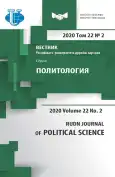Promotion of Political Values through International Programs of Academic Mobility
- 作者: De Martino M.1
-
隶属关系:
- Peoples’ Friendship University of Russia (RUDN University)
- 期: 卷 22, 编号 2 (2020)
- 页面: 312-319
- 栏目: EDUCATION POLICY
- URL: https://journal-vniispk.ru/2313-1438/article/view/322165
- DOI: https://doi.org/10.22363/2313-1438-2020-22-2-312-319
- ID: 322165
如何引用文章
全文:
详细
Nation-states and international organizations widely use educational programs to foster students’ mobility abroad. The majority of scientific literature agrees in considering exchange programs as soft power instruments used by countries to promote their values in geopolitically and economically crucial regions. However, a more in-depth analysis of the reasons motivating nation-states to adopt such initiatives is needed to understand their political goals better. The current study consists of analysing the main formulations proposed by scholars, who delved into the topic of international academic mobility as a tool to promote values. The rationales of nation-states and international organizations to develop such programs of academic mobility can be very diverse (geopolitical, economic, and civic). The author described the main principles of each rationale (or logic), providing examples of existing educational programs adopted by countries or international organizations and how political values are promoted according to each logic. The boundaries between the four rationales described in the paper are not distinct and rigid. An educational program can respond at the same time to different logics, and the nation-states decide how to allocate resources to achieve specific results ascribable to a particular rationale. Although different rationales push nation-states and international organizations in promoting international programs of academic mobility, in all cases, such programs are instruments to promote political values.
作者简介
Mario De Martino
Peoples’ Friendship University of Russia (RUDN University)
编辑信件的主要联系方式.
Email: de-martino-m@rudn.ru
PhD in Political Sciences, Deputy Head of the Department for Interaction with International Organizations of the Department for International Scientific and Educational Cooperation
6 Miklukho-Maklaya St, Moscow, 117198, Russian Federation参考
- Scott P. Globalisation and higher education: Challenges for the 21st century. Journal of Studies in International Education, 2000, 4.1: 3-10: 5.
- Spilimbergo A. Democracy and foreign education. American economic review, 2009, 99.1: 528-43; Fonte R. Higher education in service to democracy. Community College Journal, 2009, 79.5: 44.
- Katsakioris C. The Lumumba University in Moscow: higher education for a Soviet-Third World alliance, 1960-91. Journal of Global History, 2019, 14.2: 281-300; Lebovic S. From War Junk to Educational Exchange: The World War II Origins of the Fulbright Program and the Foundations of American Cultural Globalism, 1945-1950. Diplomatic History, 2013, 37.2: 280-312.
- Jokisipilä M. East or West-or both at the same time?: Higher education as a battleground for the Russian soul. The Baltic Sea region, 2014, 12: 375-399.
- Donelli F. Persuading through Culture, Values, and Ideas. Insight Turkey, 2019, 21.3: 113-134.
- Mccabe R., Ruffio P., Heinämäki P. Tempus@ 20: A Retrospective of the Tempus Programme Over the Past Twenty Years (1990-2010). EUR-OP, 2011.
- Scott-Smith G. Exchange programs and public diplomacy. Routledge handbook of public diplomacy. Routledge, 2020: 38-49.
- Scott-Smith G. Mapping the undefinable: Some thoughts on the relevance of exchange programs within international relations theory. The Annals of the American Academy of Political and Social Science, 2008, 616.1: 173-195.
- NYE, Joseph. Soft Power: Means to Success in World Politics. New York: Public Affairs, 2004. 191 p.
- Altbach P.G., Knight J. The internationalization of higher education: Motivations and realities. Journal of studies in international education, 2007, 11.3-4: 290-305.
- Universities U.K., International students now worth £25 billion to U.K. economy - new research, URL: https://www.universitiesuk.ac.uk/news/Pages/International-students-now-worth-25-billion-to-UK-economy---new-research.aspx. Accessed: 05.03.2020.
- Universities Australia, International students inject $32 billion a year into Australia’s economy - boosting Aussie jobs and wages. URL: https://www.universitiesaustralia.edu.au/ media-item/international-students-inject-32-billion-a-year-into-australias-economy-boosting-aussie-jobs-and-wages/. Accessed: 05.03.2020.
- Finn M.G. Stay rates of foreign doctorate recipients from US universities, 2007. Oak Ridge Inst. for Science and Education (ORISE), Oak Ridge, TN (United States), 2010.
- Boeri T., et al. Brain drain and brain gain the global competition to attract high-skilled migrants. 2012.
- NAFSA, The United States of America: Benefits from International Students https://www.nafsa.org/sites/default/files/media/document/isev-2019.pdf (webpage consulted on 05/03/2020).
- Papatsiba V. Political and Individual Rationales of Student Mobility: a case-study of ERASMUS and a French regional scheme for studies abroad. European journal of education, 2005, 40.2: 173-188.
- Sowa P.A. How valuable are student exchange programs? New Directions for Higher Education, 2002: 63-70.
- Marciniak D., Winnicki M. International student exchange-motives, benefits and barriers of participation. Zeszyty Naukowe. Organizacja i Zarządzanie/Politechnika Śląska, 2019, 133 Management in Industry and Services: 93-105.
- Petit I. Mimicking history: The European Commission and its education policy. World Political Science, 2007, 3.1.
- Mitchell K. Rethinking the “Erasmus Effect” on European Identity. JCMS: Journal of Common Market Studies, 2015, 53.2: 330-348.
- KING, Russell; RUIZ-GELICES, Enric. International student migration and the European’ year abroad’: effects on European identity and subsequent migration behaviour. International Journal of Population Geography, 2003, 9.3: 229-252.
- VAN MOL, Christof. The influence of European student mobility on European indentity and subsequent migration behaviour. In: Analysing the consequences of academic mobility and migration/Dervin, Fred [edit.]. 2011: 29-50.
补充文件









